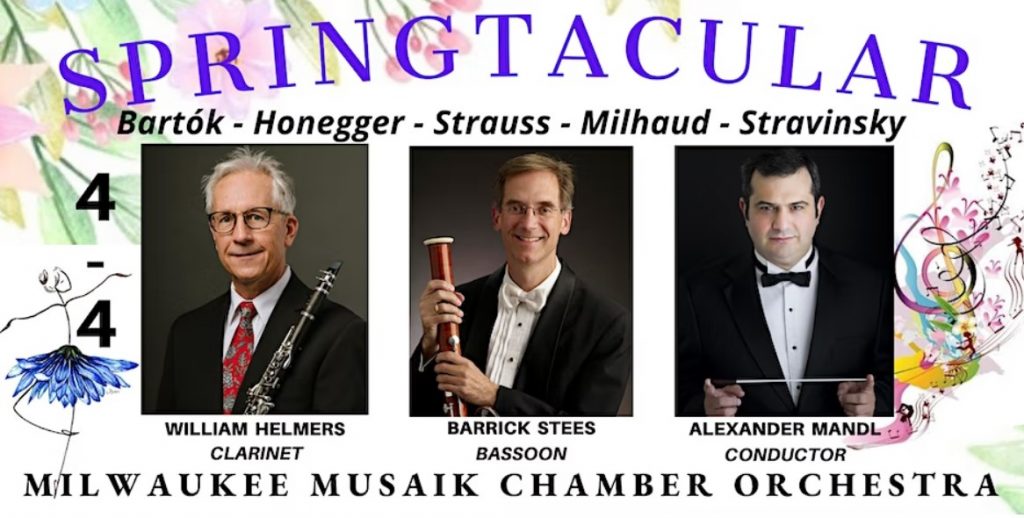Milwaukee Musaik Performs Modernist Masters
Tuesday concert includes works by Stravinsky, Bartok, Milhaud and Strauss.
Milwaukee Musaik returns to its chamber-orchestra roots when 32 musicians take the stage for “Springtacular” at 7 p.m. Tuesday, April 4 at Wisconsin Lutheran College. The program includes music by five European composers who ushered in modernist music in the first half of the 20th century: Béla Bartók (1881-1945), Richard Strauss (1864-1949), Arthur Honegger (1892-1955), Igor Stravinsky (1882-1971), and Darius Milhaud (1892-1974).
William Helmers, who recently completed a 40+-year career as a clarinet player with the Milwaukee Symphony Orchestra, and bassoonist Barrick Stees are the featured soloists in the Duet-Concertino for Clarinet, Bassoon, Strings and Harp by Richard Strauss. The assistant principal bassoonist of the Cleveland Orchestra, Stees is known in the bassoon world as both a fine performer and a technological innovator regarding his instrument.
Strauss dedicated the Duet-Concertino to his friend Hugo Burghauser, principal bassoonist with the Vienna Philharmonic before he moved to New York and played with the NBC Orchestra. Writing to Burghauser, Strauss referenced a “Beauty and the Beast”-style tale as inspiration: “A dancing princess [the clarinet] is alarmed by the grotesque cavorting of a bear [the bassoon]…. At last she is won over to the creature and dances with it, upon which it turns into a prince.”
Best known for his prodigious output of orchestral tone poems and operas, Strauss wrote the Duet-Concertino in 1947, at the age of 83. The rarely-performed work presents challenges, says Musaik conductor Alexander Mandl. Strauss uses poly rhythms throughout: different parts of the ensemble play simultaneously in different time signatures. Because conductors “only have two hands,” Mandl said, his beat at the podium displays the meter played at the moment by the largest group of musicians.
Stravinsky initially made his mark as a composer of music for ballets produced by Russian impresario Serge Diaghilev. Based on music attributed at the time to Giovani Pergolesi and the story of Pulcinella, a popular character in commedia del’arte, the ballet Pulcinella debuted in Paris in 1920, with stage and costume designs by Pablo Picasso. Two years later, Stravinsky reworked 11 of the 18 pieces in the ballet score as an orchestral suite. Musicologist William E. Runyan notes that the music “was a marked departure from the works that had secured [Stravinsky’s] reputation, and a harbinger of the new, spare style that looked back to the music of the eighteenth century for many of its precepts…. He stayed with the approach for decades, melding concepts from two different centuries into a personal style.”
Darius Milhaud is likely the least-known composer on the program. His Chamber Symphony No. 1 “Spring,” written in 1917 while Milhaud lived in Rio de Janeiro, displays the influence of Brazilian culture, jazz, and tonality. Mandl advises the audience to listen for “a bubbling flowing stream…an afternoon nap…and a witty chirp” in the three-movement, four-minute “little bon-bon.”
Springtacular will be performed at 7 p.m. Tuesday, April 4, at the Wisconsin Lutheran College Center for Arts and Performance, 8815 W. Wisconsin Ave., Milwaukee. Advance tickets are available online.
If you think stories like this are important, become a member of Urban Milwaukee and help support real, independent journalism. Plus you get some cool added benefits.
Preview
-
A Sacred Choir, 70 Voices Strong
 Dec 14th, 2025 by Martha Brown
Dec 14th, 2025 by Martha Brown
-
Prometheus Trio Goes Bohemian
 Dec 3rd, 2025 by Martha Brown
Dec 3rd, 2025 by Martha Brown
-
Present Music Offers New Choral Works
 Nov 20th, 2025 by Michael Barndt
Nov 20th, 2025 by Michael Barndt






















